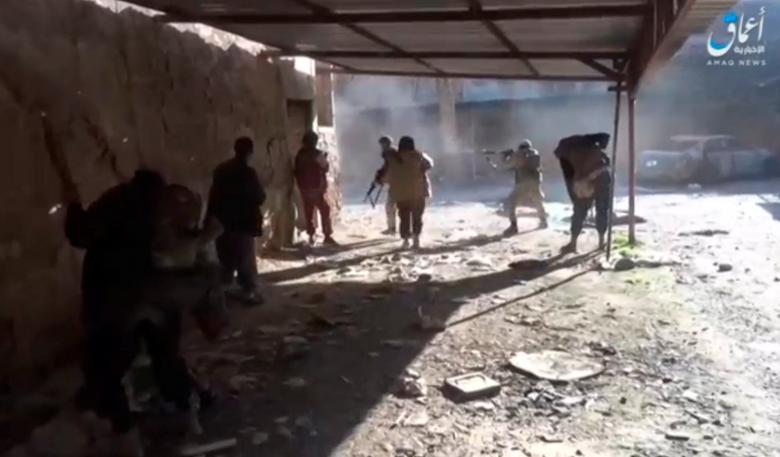Bomb factories, village command posts: Islamic State’s rural fight

A still image taken from a video posted to a social media website by the Islamic State-affiliated Amaq News Agency on March 26, 2017, shows men, said to be Islamic State fighters, firing their weapons, said to be in Western Mosul, Iraq. Social Media Website via Reuters TV

Badush, Iraq (Reuters) Islamic State fighters have pulled out of this deserted village on the Tigris river, which Iraqi commanders say was a crucial outpost defending their nearby stronghold of Mosul, but signs of their presence abound.
As the sounds of battle echo in the distance, the stinking corpses of dead militants line a path from a home they used as a command post down to the river bank.
An enormous cement plant nearby still contains dozens of rockets and booby-trapped car bombs, one of which killed sappers entering the facility on Sunday.
The fighting here is different from the intense street battles raging further to the southeast in Mosul, Islamic State’s last major urban stronghold in Iraq. The U.S.-backed offensive to drive the group out of Mosul has recaptured most of the city.
But once operations there wind down, Iraqi forces will need to capture and clear rural centers like Badush as they move west toward the Syrian border and the next target, the Islamic State-held flashpoint town of Tal Afar.
Iraqi officers in Badush say that fight will be easier, but jihadists in the many villages IS still controls toward Tal Afar have kept troops occupied weeks after they seized this area, and made their presence felt.
“Badush was an important base for Daesh (Islamic State),” Lieutenant Colonel Ali Jassem of the 9th Armoured Division said, sitting outside Badush as artillery fired at distant targets.
“It’s the starting point for the supply route from Mosul west to Tal Afar, and on toward Syria,” where the group will soon have to defend its stronghold of Raqqa.
The strategic importance of outposts like Badush was clear from what the jihadists left as they withdrew.
A large three-dimensional battle map of the area, made of earth, sticks and string, takes up the entire living room of the house next to the river.
In its tiny garden, a deep shaft led down to an underground tunnel a military official said was nearly a mile (1.60 km) long and was used to ferry supplies or fighters undetected.
The Iraqi army and Shi’ite paramilitary forces recaptured Badush earlier this month, severing supply lines and trapping militants inside the city.
Advancing toward Tal Afar should be more straightforward, Colonel Adnan Jabbar said. “It’s open ground, there are no tall buildings, no civilians to use as cover” in villages where local populations have fled as Islamic State’s grip loosens, he said.
CAR BOMBS, BOOBY TRAPS
Nonetheless, fully securing the Badush area is taking weeks.
Islamic State fighters had two years to prepare their defenses in the villages west of Mosul and are now launching suicide attacks and leaving nasty surprises behind for troops.
“Sometimes there are 10 car bombs driven into the area in one day,” Alaa Abboudi, a soldier, said.
Troops took precautions in capturing the cement factory, delaying the final assault for more than two weeks to let demoralized militants escape or come out and fight, so engineers could concentrate on de-mining it when they moved in, Jassem said.
They found no fighters inside, but accidentally triggered a booby-trapped car bomb which the militants had left, killing five soldiers, Staff Brigadier General Waleed Khalifa, deputy commander of the 9th Armoured Division said.
What they did find was several car bombs, 50 or 60 Katyusha rockets and many IEDs (improvised explosive devices), he said.
In the next village along, forces took fewer chances. A helicopter gunship fired up to 10 missiles at a brick warehouse also used to make explosives.
Of around 180 militants in Badush when Iraqi forces attacked, some were killed and some retreated to the factory before fleeing, an army media officer said. He did not now where they had headed.
